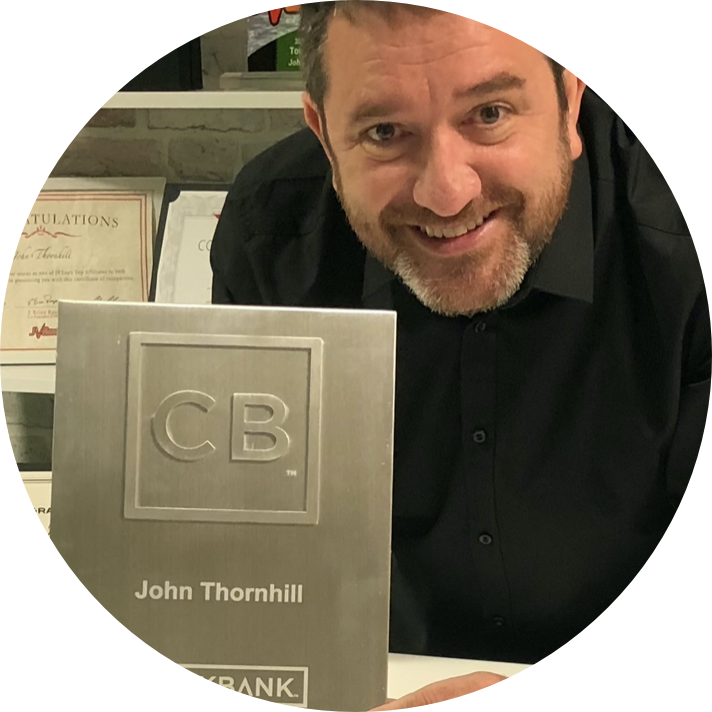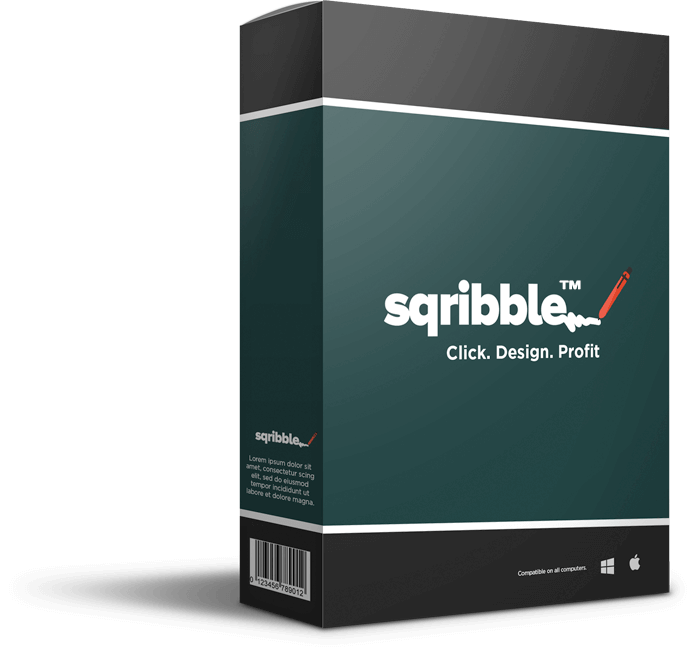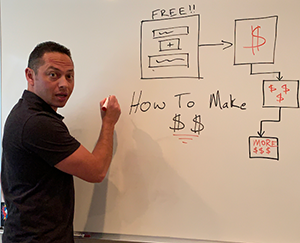Why You Should (Never) Play It Safe written by John Jantsch read more at Duct Tape Marketing
The Duct Tape Marketing Podcast with Chase Jarvis In this episode of the Duct Tape Marketing Podcast, I interview Chase Jarvis. Chase Jarvis is an award-winning artist, entrepreneur, and one of the past decade’s most influential photographers. He’s created campaigns for major brands like Apple, Nike, and Red Bull, and directed Portrait of a City, […]
Why You Should (Never) Play It Safe written by John Jantsch read more at Duct Tape Marketing
The Duct Tape Marketing Podcast with Chase Jarvis
In this episode of the Duct Tape Marketing Podcast, I interview Chase Jarvis. Chase Jarvis is an award-winning artist, entrepreneur, and one of the past decade’s most influential photographers. He’s created campaigns for major brands like Apple, Nike, and Red Bull, and directed Portrait of a City, earning an Emmy nomination. His fine art has been showcased globally, and he contributed to the Pulitzer-winning Snowfall story in The New York Times.
As a tech innovator, Jarvis created Best Camera, the first photo-based social networking app, and wrote the bestseller Creative Calling. He also founded CreativeLive, an online learning platform acquired by Fiverr in 2021, where over 50 million students have honed their creative skills.
In his new book Never Play It Safe, Jarvis dives deep into the power of safety and focused attention as key drivers of success. We examine strategies for conquering self-doubt, uncover the transformative impact of play in our lives, and underscore the essential role of practice in mastering any skill. Jarvis passionately reminds us that life’s most rewarding experiences often await beyond the boundaries of our comfort zones and urges us to focus intently on what truly matters.
Key Takeaways:
- Safety is often a construct that holds us back.
- What we focus on defines our reality.
- Attention is a superpower that shapes our experiences.
- Self-talk is crucial; we must be kind to ourselves.
- Playfulness is essential for creativity and joy.
- Everyone starts as a beginner; it’s part of the journey.
- Success is often a result of consistent practice.
- Practices and habits are crucial to achieving our goals.
- Unfortunately we are influenced by those who have given up on their dreams.
- We must challenge societal norms about success and safety.
Chapters:
- [00:00] Introduction to Chase Jarvis and His Journey
- [02:51] Defining Safety and Its Impact on Creativity
- [05:50] The Role of Attention in Achieving Success
- [08:49] Overcoming Self-Doubt and Imposter Syndrome
- [11:59] The Importance of Play in Life and Work
- [14:54] The Power of Practice in Mastery
- [17:57] Conclusion and Where to Find Chase Jarvis
More About Chase Jarvis:
- Check out Chase Jarvis’ Website
- Connect with Chase Jarvis on LinkedIn
- Grab a copy of Never Play It Safe: A Practical Guide to Freedom, Creativity, and a Life You Love
This episode of the Duct Tape Marketing Podcast is brought to you by:
Nobody does data better than Oracle. Train your AI models at twice the speed and less than half of the cost of other clouds. If you want to do more and spend less, take a free test drive at Oracle.
Testimonial (00:00): I was like, I found it. I found it. This is what I’ve been looking for. I can honestly say it has genuinely changed the way I run my business. It’s changed the results that I’m seeing. It’s changed my engagement with clients. It’s changed my engagement with the team. I couldn’t be happier. Honestly. It’s the best investment I ever made.
John Jantsch (00:16): What you just heard was a testimonial from a recent graduate of the Duct Tape Marketing certification intensive program for fractional CMOs marketing agencies and consultants just like them. You could choose our system to move from vendor to trusted advisor, attract only ideal clients, and confidently present your strategies to build monthly recurring revenue. Visit DTM world slash scale to book your free advisory call and learn more. It’s time to transform your approach. Book your call today, DTM World slash scale.
(01:02): Hello and welcome to another episode of the Duct Tape Marketing Podcast. This is John Jantsch. My guest today is Chase Jarvis. He’s an award-winning artist entrepreneur. In one of the past decades most influential photographers, he created campaigns for major brands like Apple, Nike, and Red Bull, and directed Portrait of a City earning an Emmy nomination. He’s also a founder of Creative Live, an online learning platform acquired by Fiverr in 2021, which where over 50 million students have honed their creative skills. But he’s out with a new book called Never Play It Safe, A Practical Guide to Freedom, creativity, and a Life You Love. So Chase, welcome back to the show.
Chase Jarvis (01:46): John, thanks for hosting. It’s nice to see your face. It’s been a little bit,
John Jantsch (01:49): It’s been a little bit, I have fond memories of Creative Live.
Chase Jarvis (01:54): I
John Jantsch (01:54): Got to do two shows there. It was a lot of fun. You really did something very significant there. Well,
Chase Jarvis (01:59): Thank you. Those were impactful shows that you put together and grateful to have had you on the platform. That was certainly ahead of its time, and it was fun to see the world finally recognized. What would that be? About 12 years after we started the company that, wow, hey, online learning is a really, it’s a big thing. Who knew? Yeah, it’s fun to be on the other side of that as well. That was acquired in 21 as you said, and I got to rest a little bit goof off. And then when I thought, what do I really want to spend my time doing? It was very much writing a little bit about the lessons I’d learned along the way and that gave birth to never play it safe.
John Jantsch (02:37): So as an author, I know that certainly authors and publishers pick apart titles every word in a title. Right? So let’s start, I know this is a crazy question, but how do you define safety, especially safety that holds people back, right?
Chase Jarvis (02:51): Sure, yeah. It’s important to acknowledge that this is not about belts and sunscreen. It’s not about emotional or physical safety. All of things are very important in life. The kind of safety that I’m talking about when I take on this book, this topic is the kind of safety that keeps us stuck living the lives that other people are trying to prescribe for us. The thing that is on this side of our fear and our comfort zone, and part of the reason that I ended up working on this particular book and titling the book as such is I realized when I sort of deconstructed my own experiences and having had a show and a podcast of my own where I’ve done more than a thousand episodes and many of our mutual friends are some of the world’s most creative and talented entrepreneurial people. And it turned out that when I sort of did the research on myself and folks like you and others, that man, everybody reports that all of the best stuff in their lives was on the other side of risk, on the other side of discomfort.
(03:51): So I started to ask the question, well, how can we get better at reliably going there? The word, the sort of analog is safety, because when we are taking risks or we are outside of our comfort zone, we feel unsafe sometimes in our head, mostly in our head, a little bit less in our body. But how do we get good at going there if all the best stuff in life is over there? So that was the topic of the book and how I think about the term safety. Again, the title of a book is meant to get you to pick it up, and it is, I want to make sure that people know it’s like, Hey, seat belts are real sunscreen’s. Good, let’s keep up with that stuff, but let’s, how do we get at the best stuff in life?
John Jantsch (04:31): It’s sort of playing small.
Chase Jarvis (04:33): We get
John Jantsch (04:34): Talking
Chase Jarvis (04:35): Out of living our dreams by people who’ve given up on theirs. So we end up taking advice from the wrong subset of people, the people who haven’t done what we want to do or people who are themselves afraid for us. And sometimes this is our parents, our career counselors, our peers, they have great intentions in mind, which is what makes it tricky and why so many of us fall short of our potential. There’s no evil overlord. Someone is not out there trying to keep you down. People want you to be safe, but what they’re really talking you out of is the safety, the fear that they have for if you took that chance and went after that career that only 1% of the world has. Or it turns out though, that’s again where the best stuff is and how most of us are going to feel most alive.
John Jantsch (05:23): And I wonder since this wasn’t my original question, but since you went down that path, I mean is some of that fear, especially a lot of times, like you said, they wouldn’t do that leap, but is there also a fear that you’ll be more than me, that you won’t need me anymore? I mean, is that the genesis of some of that
Chase Jarvis (05:44): Advice? It is, and it’s generally not. I think people that, especially people that are close to us, they want the best for us, but just their understanding of what is the best for us is filtered through their own filter of what’s good for them or their perception of what’s good for us. So most of those things, while you make a very valid point that some people, this is usually in the peer landscape,
(06:09): Don’t want us to leave them in the dust and go on some grand adventure when they chose to play it safe. But I think the takeaway is that there’s so many inbounds, so many inputs to our decision frameworks and processes, and it’s really managing those inputs and categorizing them appropriately that this book is about. It’s like no one’s out to wants you to live small and most of the people that are giving you advice love you very much. And still the cultural message is we celebrate people who’ve taken great risk and have helped move culturally. Society, technologically, conceptually, artistically helped us move forward, and yet we’re reluctant to take those steps in our own lives. So this is really about how do we untangle the programming and in the same way that we’re largely talked out of our creativity, you know, can walk into any first grade classroom and say, who wants to come to the front of the room and draw me a picture?
(07:12): Every hand goes up. So we get talked out of that stuff, this awareness that we are creative and it’s very similar. We get talked out of our dreams by people who think we should be all the things that their parents and the generation before, and that’s what our aspirations should be. So this is like, wait a minute, who are you to define my aspirations? Realizing that we get again talked into or out of so many of these things and how do we both acknowledge and maintain our own sort of independence and get to do the things in life that really light us up?
John Jantsch (07:50): So the book is arranged around seven, what you call levers, and I was on an AM radio show one time for one of my books, and the host had clearly not read a word of the book. And so they’re doing the interview and he goes, chapter two is called this, tell me about that. And I’ve hesitate to do that, but your book, your titles, your levers all start with one word. And I feel like we could do an entire show on tell me about attention
Chase Jarvis (08:14): Because
John Jantsch (08:16): I mean, it is pretty obvious the way you’ve arranged it. These are things that hold people up. And so I would suggest, because you call it the superpower, that attention is kind of the linchpin to starting this whole process.
Chase Jarvis (08:30): It really is. And yeah, thanks for inviting the reader to know a little bit or the listener to know a little bit about essentially when I deconstructed my successes and failures and the successes and failures of so many of our peers and friends and ordinary people who’ve lived extraordinary lives, there’s a very clear pattern that a handful of things, the same thing sort of creativity that I mentioned earlier that are native within us, but that we sort of give up on or get talked out of by just cultures messaging that man, if we actually just paid attention to some of these things and reconnected with these parts of ourselves, that’s what people who have really tapped into the best stuff in life, that’s all they’re doing. So I do trot out there’s seven levers, seven tools that live net natively within us. And the most important, and the first one in the book is attention because whether, I guess we’re largely taught to get attention, that’s how you stand out and that’s how your business becomes successful.
(09:34): That’s how you find a mate. And yet what we know about attention is that the people who are the best in the world at directing attention, at focusing at paying attention to what matters to them and what is important and can eshoo distractions and are eshoo the things that aren’t important or will make a difference in success or failure or fulfillment, that’s actually where the gold is. Because what we pay attention to literally defines the experience that we have of life. And I gave a really very challenging and heartfelt difficult example in the book Viktor Frankl, if you may be familiar with his work, he wrote an amazing book called Man’s Search for Meeting, which was about his time in 1942 in a concentration camp. And man’s search for meeting is a master class, a master work in what you pay attention to defines your existence.
(10:30): Now Viktor Frankl was in the middle of the most horrific thing that humanity may have ever known and is managing through. He’s a professional trained psychologist, so he’s got some additional skills above and beyond what our normal skill rate is, but he’s unable to have an experience that is filled with meaning and connection even in the most difficult circumstances. Now, fortunately for everyone who’s listening to this, you are not in that situation and yet it’s still true, like what you pay attention to where you direct your attention, it is the experience of your life. If you think things are hard and the world is difficult because all you’re doing is glued to social media, then that’s what your experience is going to be. By contrast, if you spend time doing what you love around people who care about you and in a connected community and get a healthy dose of nature, then you’re going to have a different experience of life so that we can control. That is what I’m calling attention to and that this is a trainable, it’s a skill that we ought to stay connected with.
John Jantsch (11:40): AI might be the most important new computer technology ever. It’s storming every industry and literally billions of dollars are being invested. So buckle up. The problem is that AI needs a lot of speed and processing power. So how do you compete without cost spiraling out of control? It’s time to upgrade to the next generation of the cloud. Oracle Cloud infrastructure or O-C-I-O-C-I is a single platform for your infrastructure, database, application development, and AI needs. OCI has four to eight times the bandwidth of other clouds offers one consistent price instead of a variable regional pricing. And of course, nobody does data better than Oracle. So now you can train your AI models at twice the speed and less than half of the cost of other clouds. If you want to do more and spend less like Uber eight by eight and Databricks Mosaic, take a free test drive@ociatoracle.com slash duct tape. That’s oracle.com/duct tape oracle.com/duct tape. You see on social media, as you mentioned all the time, people posing the idea of imposter syndrome, which is really to me is sort of saying, I don’t trust myself or I mean, how much of that do you see playing a role that there’s almost like a self-sabotage that goes on because I don’t trust myself enough to actually do this thing, so I’m going to distract myself with something else.
Chase Jarvis (13:09): It’s so true, John, and I think it’s a smart point to bring up in the book. I frame it as such that, but the world does some dirty work on us by telling us the things that we should be and what we should do and whatnot, but we actually do the dirtiest work on ourselves. The most important words that we say are the ones that we say to ourselves and to me being able, this goes hand in hand with attention. What messages are we giving ourselves? Of course, if the world wants us to be either accountants or doctors or lawyers, when we really want to be a YouTuber, an artist or a race car driver, I’m not articulating one is more virtuous than the other, but there are dominant paradigms and if we buy into that and start telling ourselves stories about who we were yesterday and what we can possibly do achieve or how we can be connected or fulfilled in this life, then again, we are the ones that we’re in conversations with most, right between our ears.
(14:19): So the goal in learning to pay attention or to direct attention is that what you feed yourself matters and choosing to feed yourself not junk food is out. It has a tremendous downstream effect on what’s possible with our one precious life. So as you mentioned, imposter syndrome and there’s all sorts of other, I guess, related things that, look, we can’t pretend that these things don’t exist, but what if we developed the muscle that when we made a mistake, it wasn’t that we talked so nasty to ourselves, but what if of ourselves as experience, what kind encouraging thing would we say like, Hey, that’s not like me. Next time I’m faced with this, I’m going to do X instead of Y. That’s how we would talk to our friends, and yet we don’t have that relationship with ourselves way too often. So this particular chapter is trying to get us to realize words matter, what we say to ourselves, matter matters, and that we’re actually in charge of that.
(15:22): Whether we think so or not, the world is happening for us and it’s our job to do what we can get in the driver’s seat and pay attention to the things that truly do matter. What if you started, there’s that famous exercise and we’ll play it here for anyone who if as soon as you get the gig, then stop playing and listen. If you haven’t played before, then follow along and it goes like this. Look around wherever you are right now and notice for me take 10 seconds and count everything in your field of view. That’s red. Go ahead now just look around and count everything in your field of view. That’s red and you’re kind of going, okay, 1, 2, 3, 4. I mean right now the truth is you’re even calling things that are sort of rust. You’re calling them red too to do as many things as you can to chalk up all the things you’re looking for.
(16:12): Now the question is how many blue things did you see? And you’re like, wait a minute. That’s the punchline. You see exactly the things that you’re looking for. So how does that extend had we extend this metaphor to our lives? Well, what we pay attention to and what we’re looking for, what messages we are telling ourselves between our ears really, really matters downstream to what we see in the experience that we have. So if you can decide that you’re going to be open to a universe of colors or that you are especially going to look for things that light you up rather than the blueprint, as I mentioned earlier, that social media might have us believe or an imposter syndrome would have us believe, then that’s what you’re going to see. So how do we get out of the backseat, get into the driver’s seat, and again, the phrase that stop playing it safe because the world wants you to be safe. Your biology thinks that in choosing to become a YouTuber or to pursue your passion or to eshoo the, let’s call it the career that your career counselor or that your parents wanted for you, that’s somehow riskier. But the truth is it’s all risky. How risky is it to park the desires that you have for this one precious life until it’s too late? I would say that’s the ultimate risk.
John Jantsch (17:30): So a lot of two people when they decide, I’m not going to play it safe, I’m going to go all in, right? I’m going to go for it. Sometimes that leads to blinded like I’m on the goal, nothing else matters. And lever five is play the most important work we do. And I would suggest, especially since you’ve called it the most important work we do, it’s probably the one that people counterintuitively forget.
Chase Jarvis (17:53): Absolutely. And what I like to think about in terms of that is success leaves clues. So think about the time, and this is, anyone can do this right now, while if you’re sitting in traffic or walking on the walking path or on, you’re at the gym with us in your ears right now. Think about the times where you felt the most lit up, the happiest, most playful, the highest version of yourselves. I promise you there was levity in your day-to-day in moment to moment, there was joy, there was connection. And yet whether this is our puritanical roots or the culture, this work hard culture, this grindy culture that we have become a part of or that’s memeable on social media, it ignores that playful part of ourselves and that’s playfulness and joy. That’s the engine of life. It truly is. And the world might have you believe otherwise that the tortured artist is really where the best work comes from.
(18:54): And yet look at the people who’ve had really long, fruitful, rich, connected careers and have been doing what they’re doing for a really long time. This joy, this playfulness, it can be brought to anything even to work. Again, watch an 8-year-old, you say, okay, it’s time to pick up your toys. And they might be disappointed that they’ve got to pick up at their toys, but they’re going to make room noises while they’re running around the room, grabbing the toys and picking up their stuff. That’s our natural state is to seek, find and engage in play. And yet as an adult, we somehow disconnect from that thinking that, oh, it’s all about work and play is something that we only do after all of the work is done. Well, let me tell you, there’s never a time where all of the work is done. So do not deny this great state that it pays dividends to be in for some future time that never comes.
John Jantsch (19:50): So you’re not supposed to have favorites, I suppose. But my favorite is practice. And the reason, I mean, that sounds really boring, the grunt work, right? But you have a set of principles in there that I think by themselves really are a masterclass. And I think a lot of people, I was talking to somebody who’s a writing coach and he said, you won’t believe how many people show up and say, I want to write a fiction book, but I’ve never written one. I’ve never taken any classes I’ve never practiced. And it’s like, no, it’s all practice and it’s being okay with being really bad, but that’s not what people want to hear. It’s like I want the magic pill. But to me it’s my favorite because I think it really is what brings it to the heart.
Chase Jarvis (20:32): Absolutely. And there’s nothing like if you can’t be willing to look foolish beginning something, then you will do nothing because we’re all terrible at everything when we start out. Think of how basic, if you had an able-bodied child watching them learn to walk,
(20:53): It looks like it’s the most difficult thing in the world. And yet we all walk around completely unconscious. If you’re an able-bodied person and without thinking about it and everything, including something as basic as that takes practice, why then would we think that that career we want the outcomes that artistic, the master work of fiction that we completed, why would we think that we could somehow become, do that without a whole lot of stumbling and some really important good foundational habits, IE practices to go with it? And the reason there are manyfold, but one is that now we can see the best in the world do their thing effortlessly at any time by just picking up our phone, staring at it for five minutes. You don’t see the iceberg of work underneath the surface. You just see someone who’s the best in the world that unlike thousands of years ago when we were in tribes and we watched someone start to not know how to hunt, then to become the best hunter in the tribe, we watched it with our own eyes and it made sense to us. Now we just see what appears to be effortless brilliance everywhere. Well, I’ll tell you what, underpins every person you look up to, admire, appreciate for the things that they have done or the people they’ve become in their life is a set of really profound, often very basic practices that they’ve put into play and that’s available to you. It’s just understanding what practices, what habits are going to get you to your desired outcomes.
John Jantsch (22:27): Well, chase, I appreciate you taking a moment to stop by the Duct Tape Marketing podcast. It is always so great to visit with you. Another excellent book. Where would you invite people to connect with you or certainly find a copy of Play It Safe,
Chase Jarvis (22:41): Never Play It Safe is available everywhere books are sold and Amazon will ship it to you wherever you are. If you can support your local, that’s cool too. And I’m just Chase Jarvis everywhere on the internet. So Instagram, YouTube, Twitter x, I don’t know what they call it anymore, but I’m just Chase Jarvis everywhere. I’d love to connect with you. I’ve got a popular email newsletter if you like, these tidy bits. But John, just hat tip to you for running such a tight ship and building the community that you have over there. And I love Duct tape and grateful to always be welcome to feel welcome here and to be a guest on the show. Thanks for having me.
John Jantsch (23:15): Alright, well again, thanks for stopping by and hopefully we’ll see you one of these days out there on the road.
Sign up to receive email updates
Enter your name and email address below and I’ll send you periodic updates about the podcast.
Recommended Story For You :

How To Make $3493 Commissions Without Doing Any Selling

Successful dropshippers have reliable suppliers.

People Think I Use A Professional Voiceover Artist. NO! I Just Use Speechelo!

Make Money Testing Apps On Your Phone Or Tablet

Make More Money or Lose Everything

Sqribble Is The ONLY eBook Creator You’ll Ever Need.

Work & Earn as an Online Assistant

Create Ongoing Income Streams Of $500 To $1000 Or More Per Day

It's The Internet's Easiest Side Business.






